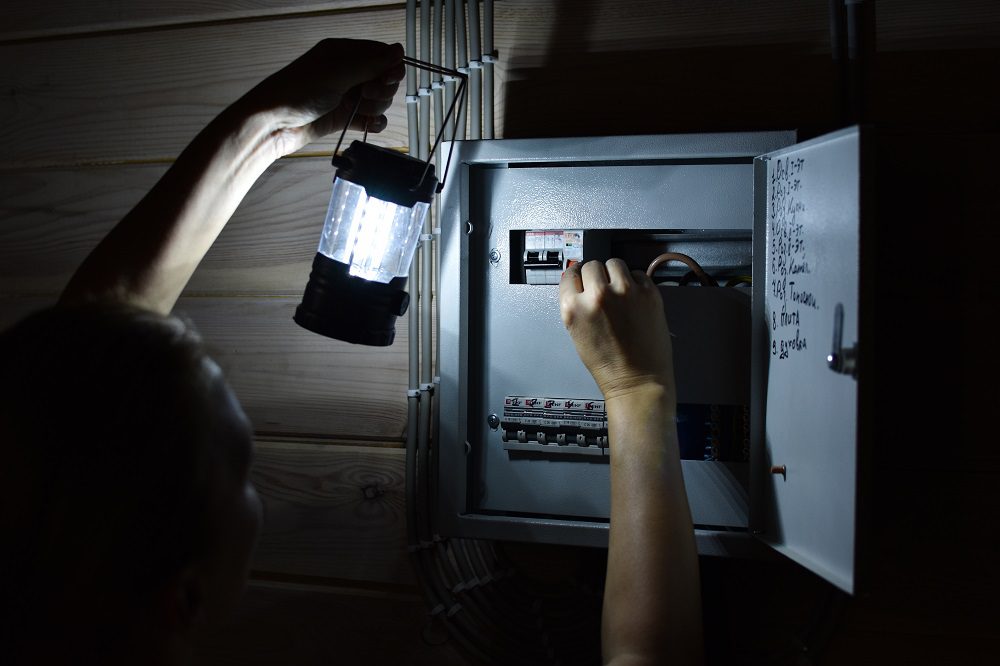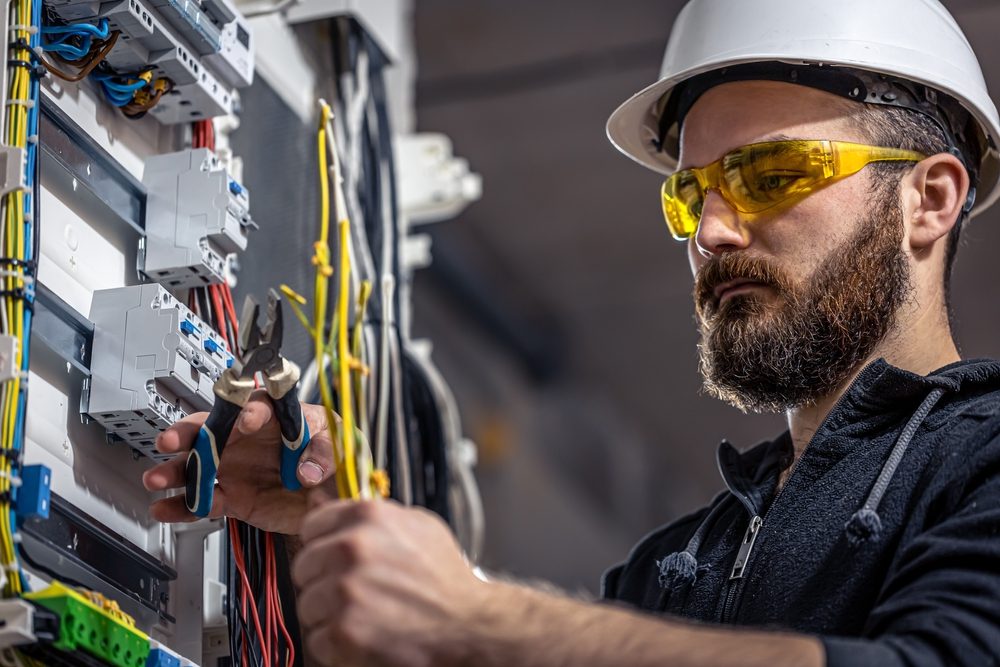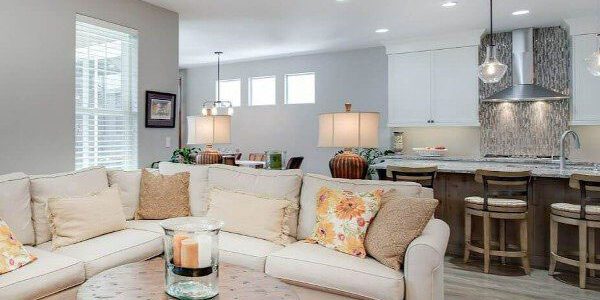
Why Extension Cords Are a Red Flag for Wiring Problems
Homeowners reach for extension cords because they are quick. In many Charlotte homes, though, they hint at deeper wiring issues. If a living room needs three cords to power lamps, a home office runs on a power strip daisy-chained to another, or the garage fridge shares a cord with tools, the wiring layout is likely undersized or outdated. This practice raises fire risk, hides nuisance tripping, and drives up long-term costs.
How extension cords create risk
Extension cords are temporary by design. Their thin insulation and flexible conductors run hotter under load than permanent wiring. They lie on rugs, pinch behind furniture, and get kinked near plugs. Heat builds at connection points. The plug blades loosen with use. Resistance rises, which means more heat again. A 1500-watt space heater or hair dryer on a cord not rated for that load can push temperatures beyond safe limits within minutes.
Cords also encourage bad habits. If outlets are scarce, people plug a power strip into an extension cord, then add another strip. This configuration defeats the circuit’s built-in safeguards. Breakers protect the branch wiring in the walls, not the thin cord stretched under a couch. The breaker may trip late because the wall wiring is still within limits while the cord cooks.
What extension cords often reveal about a home’s wiring
In Charlotte’s older neighborhoods like Plaza Midwood, Elizabeth, Dilworth, and Wilmore, homes built before the 1970s were wired for different loads. Kitchens had fewer countertop outlets, living rooms often had a single duplex, and bedrooms rarely had dedicated circuits. Over time, appliance wattage and electrical wiring Charlotte NC the number of electronics climbed. If a family relies on cords daily, the electrical system likely shows one or more of these traits:
- Too few outlets in high-use rooms, especially kitchens, living rooms, and home offices.
- Circuits that trip under normal use because multiple rooms share one 15-amp circuit.
- Two-prong outlets with no equipment grounding, which limits safe use of modern devices.
- Aging aluminum branch wiring from the late 1960s to early 1970s that runs hot at terminations.
- Mixed DIY work, such as back-stabbed receptacles or loose wirenut splices, that lose tension over time.
An experienced electrical wireman sees extension cords as symptoms, not solutions. He or she looks for load imbalances, undersized circuits, and outlet placement that no longer matches how the home is used.

Common Charlotte scenarios the team sees
In South End condos, entertainment centers cluster in one corner, but the original layout placed a single duplex on the opposite wall. A TV, soundbar, streaming device, game console, and lamp end up on one cord and strip. The better fix is to add two new outlets on the media wall, fed by a dedicated 20-amp circuit.
In University City townhomes, remote work turned dining areas into offices. Laptops, docks, monitors, printers, and space heaters push a 15-amp shared circuit past its limit. The safe answer is a new home office circuit with AFCI protection and enough outlets spaced every 6 feet per current code practices.
In ranch homes across Matthews and Mint Hill, garages gain freezers and EV level 1 charging. An extension cord from a GFCI bathroom outlet across a hallway signals the need for a dedicated garage circuit and, often, a 240-volt receptacle for faster EV charging.
Risks homeowners cannot see
Damaged insulation is the obvious risk. The hidden risks are more serious. Loose receptacle contacts inside a worn outlet arc under load, creating carbon tracks. Aluminum-to-copper splices made without approved connectors expand and contract, loosening over years. Back-stabbed connections on receptacles lose spring tension and heat up. None of this shows until someone smells hot plastic or finds a warm faceplate.
Proper residential electrical wiring in Charlotte NC addresses these risks by using tight screw-terminal connections, correct gauge conductors for the breaker size, and modern protective devices like AFCI and GFCI where required. Good design places outlets where people actually plug in, so cords become the rare exception.

Safer alternatives to extension cords
If an extension cord solves a daily problem, the wiring plan needs an update. A few practical upgrades remove the hazard and improve convenience:
- Add outlets in the right places: living rooms, media walls, kitchen counters, and home offices.
- Install dedicated 20-amp circuits for kitchens, laundry, and workshops to handle real loads.
- Bring bedrooms and living areas onto AFCI-protected circuits; use GFCI where water is present.
- Replace two-prong receptacles with grounded outlets if a grounding path exists, or add GFCI protection if grounding is not feasible.
- Consider whole-home rewiring in homes with aluminum branch circuits or widespread knob-and-tube.
These steps fall under professional electrical wiring services and should not rely on guesswork. A licensed electrical wireman uses load calculations, code requirements, and real-world use patterns to design the fix.
What an assessment looks like with Ewing Electric Co.
A site visit starts with questions about how the family uses each room. The electrician maps which outlets belong to which breakers and measures voltage drop under load on long runs. He checks panel capacity and labeling, then tests GFCI and AFCI devices. Where heat buildup is suspected, he inspects terminations and looks for discoloration on cords or plugs that shows chronic overheating.

The repair plan may be simple, such as adding two outlets to a living room on an existing circuit with capacity. It may involve a new 20-amp small-appliance circuit across the kitchen with tamper-resistant, GFCI-protected receptacles spaced along the backsplash. In some homes, rewiring Charlotte NC becomes the practical choice, especially when tackling multiple rooms, grounding issues, and an undersized panel at once.
Cost ranges Charlotte homeowners ask about
Electrical wiring Charlotte NC cost varies with scope, access, and finish work. Ballpark ranges help with planning:
- Add a standard 120-volt receptacle on an accessible wall, same-floor circuit extension: roughly $175 to $350 per outlet, depending on wall type and distance.
- New dedicated 20-amp circuit to a media wall or home office: typically $450 to $1,000, depending on panel location, attic/crawl access, and number of outlets.
- Kitchen small-appliance circuits with GFCI protection and backsplash outlets: $900 to $2,500, depending on tile cuts and cabinet access.
- Partial rewiring of a room or two with grounding upgrades: $1,500 to $4,000.
- Whole-home rewiring Charlotte NC for older 1,500 to 2,000 sq ft homes: often $8,000 to $18,000, with drywall patching on top where needed.
These are typical ranges seen on jobs across Charlotte, Matthews, Mint Hill, Huntersville, and Pineville. A written estimate after an on-site review gives a more accurate number for each property.
How to know if you need an electrical wiring repair service
Several clues say the home needs a professional look rather than another cord. Breakers that trip during routine use indicate overloaded circuits. Lights that dim when a vacuum or microwave starts point to voltage drop or shared circuits under strain. Warm outlets or a slight burning smell near furniture plugs suggest loose contacts. Two-prong outlets in rooms with modern electronics signal grounding issues. Frequent use of space heaters to fix cold spots often overloads living room circuits; a dedicated circuit or HVAC adjustment is safer.
If a homeowner searches for electrical wiring near me because cords have become permanent, a licensed team can map the problem and make it safe. A focused electrical wiring repair service should find the root cause, not just replace receptacles.
Why permanent wiring beats temporary cords every time
Permanent wiring distributes load evenly. Outlets are placed to match furniture and appliance locations, which cuts cord length and heat. Breakers and modern protective devices work as intended. The home gains value, and daily life gets simpler. Insurance carriers and home inspectors favor permanent solutions, and appraisers in Charlotte often flag visible cord reliance as an indicator of deferred electrical maintenance.
What to expect from Ewing Electric Co.
Ewing Electric Co. serves homeowners across Charlotte and nearby neighborhoods with practical, code-compliant solutions:
- Clear diagnosis: identify why the cords appeared in the first place.
- Transparent pricing: written options for repair, circuit additions, or rewiring, with line-item clarity.
- Respect for the home: clean cuts, tidy runs, and patch-friendly access methods.
- Permit and inspection handling: jobs meet local code and pass inspection the first time.
- Scheduling that fits: most outlet additions wrap in half a day; new circuits often finish same day.
Whether the need is a small electrical wiring repair service or a larger plan for residential electrical wiring Charlotte NC, the team builds the fix around how the home is used, not a template.
Ready to ditch the cords?
If extension cords have become permanent in a Charlotte home, it is time for a safer plan. Search habits like “electrical wiring near me” help start the process, but a quick call gets a clearer answer. Ewing Electric Co. provides electrical wiring services that remove guesswork, curb fire risk, and make rooms work the way people live. Ask about same-week assessments in Dilworth, Ballantyne, NoDa, SouthPark, and surrounding areas. Request an estimate for outlet additions, new circuits, or rewiring Charlotte NC, and get a clear number on electrical wiring Charlotte NC cost before any work starts.
Ewing Electric Co provides dependable residential and commercial electrical services in Charlotte, NC. Family-owned for over 35 years, we handle electrical panel upgrades, EV charger installation, generator installation, whole-home rewiring, and 24/7 emergency repairs. Our licensed electricians deliver code-compliant, energy-efficient solutions with honest pricing and careful workmanship. From quick home fixes to full commercial installations, we’re known for reliable service done right the first time. Proudly serving Charlotte, Matthews, Mint Hill, and nearby communities. Ewing Electric Co
7316 Wallace Rd STE D Phone: (704) 804-3320 Website:
https://ewingelectricco.com/ |
Electric Company in Charlotte
Social:
Facebook |
Instagram |
Twitter |
LinkedIn |
Yelp |
Angi |
BBB
Map: View on Google Maps
Charlotte,
NC
28212,
USA